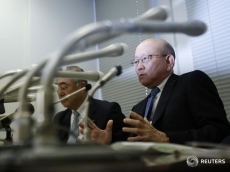The author is a Reuters Breakingviews columnist. The opinions expressed are her own.
It’s back-to-front dealmaking at its best. Two Asian conglomerates are jointly spending $10.4 billion on a 20.6 percent stake in their largest Chinese counterpart. Only then will Japanese trading house Itochu Corp, Thai tycoon Dhanin Chearavanont and China’s CITIC Limited decide how they can work together to create value. The unlikely alliance helps state-controlled CITIC tick another "reform” box while actually giving up very little.
There’s no doubting the Japanese-Thai duo’s financial commitment. CT Bright, a vehicle jointly owned by Itochu and Dhanin’s CP Group, will buy preferred shares worth $5.9 billion that convert into ordinary stock within three months. CITIC’s state-owned parent will also sell the pair shares worth another $4.4 billion. Both transactions value CITIC shares at HK$13.8, a 3.6 percent premium to its closing price the day before the announcement.
The deal allows CITIC to further broaden its shareholder base. The $43 billion group has issued shares worth almost $6 billion to 25 outside investors including Singapore’s Temasek and other Chinese state-owned enterprises as part of its backdoor listing in Hong Kong last year. Bringing in more external shareholders allows China to demonstrate its commitment to reforming the ownership of state-owned groups, even though the government remains firmly in charge.
For Itochu and CP Group, the benefits are harder to identify. The two companies acquired stakes in each other six months ago and are keen to expand in the food business and in China. They get two seats on CITIC’s board and an agreement to look into cooperation in areas including consumer industries, real estate, resources, and financial services. Given the three companies’ sheer scale and geographical reach there are bound to be opportunities to create value. But the lack of detail means investors have to take that on trust.
Privately-owned CP Group can ignore such concerns. But Itochu shareholders seem unimpressed with the plan to spend the equivalent of almost a third of the company’s $17 billion market capitalisation. The Japanese group’s shares have fallen almost 12 percent since the deal was first reported in early December. If there’s a bigger picture here, it’s hard to see.
Follow us !











